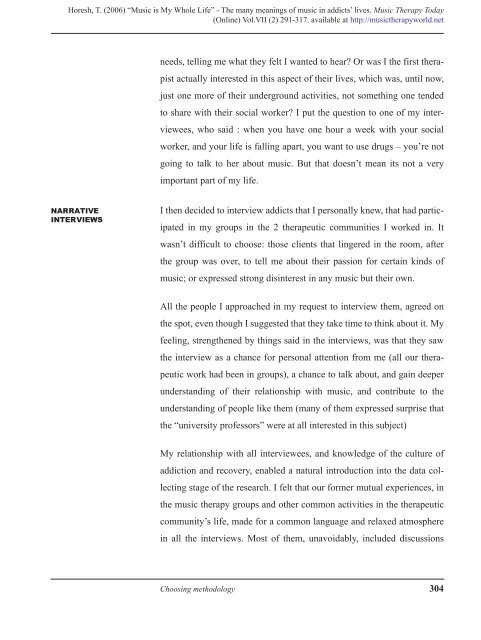Music Therapy Today - World Federation of Music Therapy
Music Therapy Today - World Federation of Music Therapy
Music Therapy Today - World Federation of Music Therapy
Create successful ePaper yourself
Turn your PDF publications into a flip-book with our unique Google optimized e-Paper software.
Horesh, T. (2006) “<strong>Music</strong> is My Whole Life” - The many meanings <strong>of</strong> music in addicts’ lives. <strong>Music</strong> <strong>Therapy</strong> <strong>Today</strong><br />
(Online) Vol.VII (2) 291-317. available at http://musictherapyworld.net<br />
NARRATIVE<br />
INTERVIEWS<br />
needs, telling me what they felt I wanted to hear? Or was I the first thera-<br />
pist actually interested in this aspect <strong>of</strong> their lives, which was, until now,<br />
just one more <strong>of</strong> their underground activities, not something one tended<br />
to share with their social worker? I put the question to one <strong>of</strong> my inter-<br />
viewees, who said : when you have one hour a week with your social<br />
worker, and your life is falling apart, you want to use drugs – you’re not<br />
going to talk to her about music. But that doesn’t mean its not a very<br />
important part <strong>of</strong> my life.<br />
I then decided to interview addicts that I personally knew, that had partic-<br />
ipated in my groups in the 2 therapeutic communities I worked in. It<br />
wasn’t difficult to choose: those clients that lingered in the room, after<br />
the group was over, to tell me about their passion for certain kinds <strong>of</strong><br />
music; or expressed strong disinterest in any music but their own.<br />
All the people I approached in my request to interview them, agreed on<br />
the spot, even though I suggested that they take time to think about it. My<br />
feeling, strengthened by things said in the interviews, was that they saw<br />
the interview as a chance for personal attention from me (all our thera-<br />
peutic work had been in groups), a chance to talk about, and gain deeper<br />
understanding <strong>of</strong> their relationship with music, and contribute to the<br />
understanding <strong>of</strong> people like them (many <strong>of</strong> them expressed surprise that<br />
the “university pr<strong>of</strong>essors” were at all interested in this subject)<br />
My relationship with all interviewees, and knowledge <strong>of</strong> the culture <strong>of</strong><br />
addiction and recovery, enabled a natural introduction into the data col-<br />
lecting stage <strong>of</strong> the research. I felt that our former mutual experiences, in<br />
the music therapy groups and other common activities in the therapeutic<br />
community’s life, made for a common language and relaxed atmosphere<br />
in all the interviews. Most <strong>of</strong> them, unavoidably, included discussions<br />
Choosing methodology 304

















